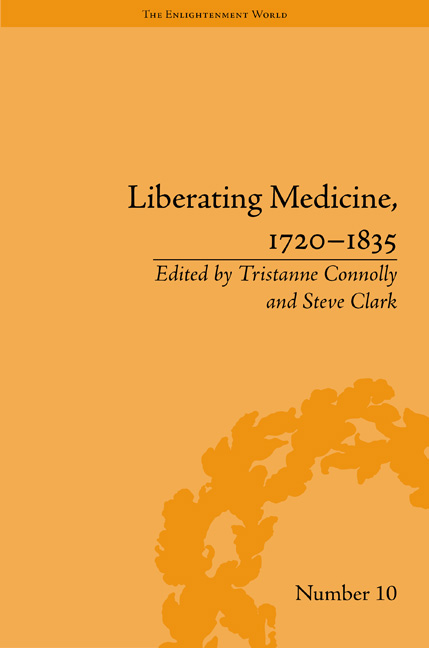Book contents
- Frontmatter
- CONTENTS
- Acknowledgements
- Contributors
- List of Figures
- Introduction
- I Spiritual Sickness and Hypochondria
- II Health and Emancipation
- III Madness
- IV Anatomized and Aestheticized Bodies
- V Birth
- 15 Anna Barbauld's ‘To a Little Invisible Being…’: Maternity in Poetry and Medicine
- 16 ‘Some Heart Once Pregnant with Celestial Fire’: Maternal Elegy in Gray and Barbauld
- Notes
- Works Cited
- Index
15 - Anna Barbauld's ‘To a Little Invisible Being…’: Maternity in Poetry and Medicine
from V - Birth
- Frontmatter
- CONTENTS
- Acknowledgements
- Contributors
- List of Figures
- Introduction
- I Spiritual Sickness and Hypochondria
- II Health and Emancipation
- III Madness
- IV Anatomized and Aestheticized Bodies
- V Birth
- 15 Anna Barbauld's ‘To a Little Invisible Being…’: Maternity in Poetry and Medicine
- 16 ‘Some Heart Once Pregnant with Celestial Fire’: Maternal Elegy in Gray and Barbauld
- Notes
- Works Cited
- Index
Summary
Anna Barbauld's ‘To a Little Invisible Being who is Expected Soon to Become Visible’ is perhaps the most anthologized British Romantic poem on maternity, and the least representative. Critics as different as Jerome McGann and Julie Kipp have read the poem metaphysically. For McGann, in The Poetics of Sensibility, it is ‘a poem about poetry’ which is ‘pregnant with the reality it celebrates’. McGann emphasizes that ‘Barbauld's perceived inability to control this process of energies becomes a poetic figure of a new kind of artist (one who “watches and receives”)’, but I would take issue with the novelty here, as well as the sublimation of birth into metapoetry; this kind of organicist view is standard from at least the mid-eighteenth century onward, as in (to cite a major example) Edward Young's Conjectures on Original Composition (1759). For Kipp, in Romanticism, Maternity and the Body Politic, Barbauld's poem communicates the mother's ‘captivation’ by the child; she is alienated from herself in pregnancy, yet the child mirrors her own subjectivity. Though interpretations centred on the creation of self and art fit nicely with traditional concerns of Romanticism, and thus make the poem eminently anthologizeable and teachable, both McGann and Kipp misread the poem at a basic level. Both assume the speaker is the mother, despite the use of the third person, and without biographical qualms: Barbauld never gave birth. But it is not writing from lack of personal experience that makes Barbauld's poem unusual. Many of her contemporaries wrote on maternity, even taking on mothers’ voices, before, or without, having children of their own, for instance, her friend Joanna Baillie (whom McGann pairs with Barbauld in his discussion).
The question of who could claim authority to write about maternity on what basis was struggled over in the medical sphere through much of the seventeenth and eighteenth centuries. Since the men of the Chamberlen family and their secret invention (possibly the forceps) had made incursions into the traditionally female management of childbirth, extended debate was carried out in print over whether women midwives, with their knowledge handed down through generations of women and their skills perfected through apprenticeship and active attendance at labours, or medical men, with their theoretical and anatomical knowledge, and their use of instruments and potential to apply scientific advancements, were best qualified to understand and oversee pregnancy and birth.
- Type
- Chapter
- Information
- Liberating Medicine, 1720–1835 , pp. 209 - 224Publisher: Pickering & ChattoFirst published in: 2014



